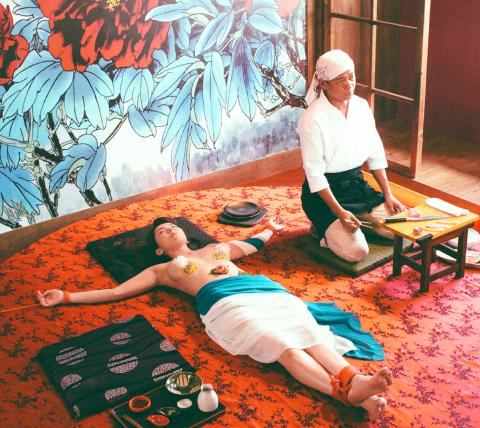A Japanese porn star, sushi and a gay man known for his mastery of fellatio are the elements that promise an evocative film about food and sex. But director Pan Chih-yuan (潘志遠) quickly exposes his filmmaking incompetence in Sashimi (沙西米) and kills the story. Also gone to waste is the potentially interesting cast led by Lee Kang-sheng (李康生) — muse to auteur Tsai Ming-liang (蔡明亮) — and Yui Hatano, a big-name star in the world of Japanese adult video (AV).
The film opens with Hatano going through the motions of a sex act in an adult video. The pixelated close-up of her face reveals an empty simulation of eroticism. It is a stroke of genius, but unfortunately, the whole film quickly goes downhill after the opening scene. Set in the immediate aftermath of the Tohoku earthquake and tsunami in 2011, the drama revolves around Natsumi (Hatano), a porn star who learns that her boyfriend is HIV-positive. Taking advantage of the rumor that she died in the devastating tsunami that struck Fukushima, Natsumi leaves her old life behind and comes to stay at a bed and breakfast in Taiwan with her agent, Tamura (Iguchi Daiyu).
What brings Natsumi to the B&B is its owner and sashimi chef Chen-ming, played by Lee.

Photo courtesy of Good Day Films
At the B&B, things start spinning out of control with the arrival of Natsumi. Having enjoyed Chen-ming’s sashimi so much that she has formed a habit of exchanging sex for food, waitress Hsiao-ming (Teresa Daley, 紀培慧) is driven mad with jealousy at Chen-ming’s passion for Natsumi.
Meanwhile, Chen-ming is determined to find out who Natsumi really is. Years ago, the chef prepared a banquet of nyotaimori, a Japanese culinary practice that involves serving sushi on a naked woman’s body, with his then-wife Yoshiko as the living sushi platter. The banquet went terribly wrong, prompting the wife to leave. He’ll now perform the same culinary ritual on Natsumi to see if his suspicions are correct.
Pan’s cinematic approach to sex and eroticism is tedious and bland. Even the nyotaimori scene is lifeless.

Photo courtesy of Good Day Films
The film further suffers from a lack of coherence and focus. In between the boring sex scenes, some cheap laughs are thrown in, awkwardly delivered by a few sidekicks, including the character played by Daiyu, a Tokyo gay bar owner-turned-celebrity after giving a blow-job to an AV actor adept at holding back orgasm and making the man come in a television show. The instant celebrity, like the rest of the cast members, is merely used to move the tedious story to its end.
Wedding a high-profile cast with a script to explore the rarely visited territory of sex and sexuality, Sashimi surely started out as an ambitious project, which makes it more regrettable that it’s a tedious flop.

In the March 9 edition of the Taipei Times a piece by Ninon Godefroy ran with the headine “The quiet, gentle rhythm of Taiwan.” It started with the line “Taiwan is a small, humble place. There is no Eiffel Tower, no pyramids — no singular attraction that draws the world’s attention.” I laughed out loud at that. This was out of no disrespect for the author or the piece, which made some interesting analogies and good points about how both Din Tai Fung’s and Taiwan Semiconductor Manufacturing Co’s (TSMC, 台積電) meticulous attention to detail and quality are not quite up to

April 21 to April 27 Hsieh Er’s (謝娥) political fortunes were rising fast after she got out of jail and joined the Chinese Nationalist Party (KMT) in December 1945. Not only did she hold key positions in various committees, she was elected the only woman on the Taipei City Council and headed to Nanjing in 1946 as the sole Taiwanese female representative to the National Constituent Assembly. With the support of first lady Soong May-ling (宋美齡), she started the Taipei Women’s Association and Taiwan Provincial Women’s Association, where she

Chinese Nationalist Party (KMT) Chairman Eric Chu (朱立倫) hatched a bold plan to charge forward and seize the initiative when he held a protest in front of the Taipei City Prosecutors’ Office. Though risky, because illegal, its success would help tackle at least six problems facing both himself and the KMT. What he did not see coming was Taipei Mayor Chiang Wan-an (將萬安) tripping him up out of the gate. In spite of Chu being the most consequential and successful KMT chairman since the early 2010s — arguably saving the party from financial ruin and restoring its electoral viability —

It is one of the more remarkable facts of Taiwan history that it was never occupied or claimed by any of the numerous kingdoms of southern China — Han or otherwise — that lay just across the water from it. None of their brilliant ministers ever discovered that Taiwan was a “core interest” of the state whose annexation was “inevitable.” As Paul Kua notes in an excellent monograph laying out how the Portuguese gave Taiwan the name “Formosa,” the first Europeans to express an interest in occupying Taiwan were the Spanish. Tonio Andrade in his seminal work, How Taiwan Became Chinese,